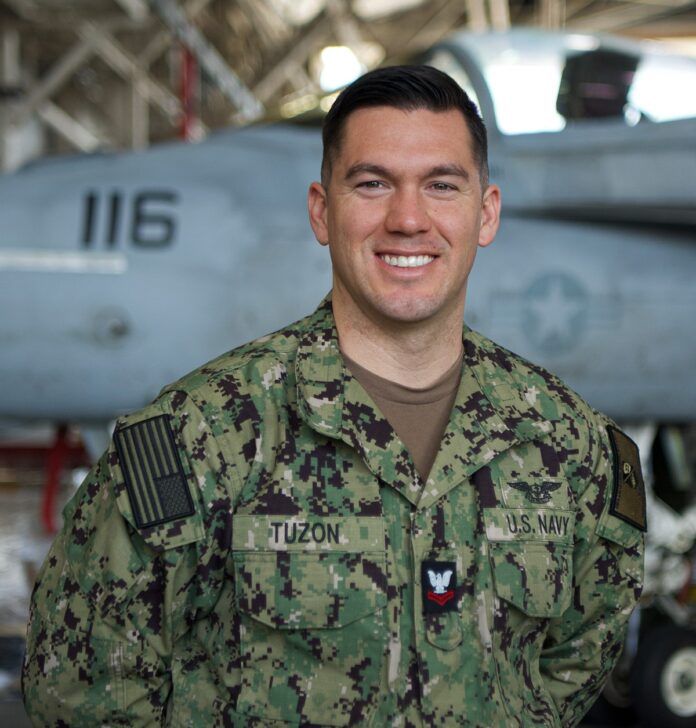By Senior Chief Mass Communication Specialist John Osborne
Navy Office of Community Outreach
VIRGINIA BEACH, Va. – Petty Officer 2nd Class Cameron Tuzon, a native of San Diego, serves the U.S. Navy assigned to Strike Fighter Squadron (VFA 106), which operates the U.S. Navy’s F/A-18 Super Hornet, nicknamed the Rhino.
Tuzon graduated from Patrick Henry High School in 2012.
The skills and values needed to succeed in the Navy are similar to those found in San Diego.
“More than anything, I learned the importance of attention to detail and having a strong work ethic growing up,” said Tuzon. “Learning how to stay disciplined and humble is essential.”
Tuzon joined the Navy 11 years ago. Today, Tuzon serves as an aviation machinist’s mate.
“Both of my parents were in the Navy and I wanted to carry on the family tradition,” said Tuzon. “I also went to an airshow when I was eight years old and saw the Blue Angels. I never missed another airshow after that. I eventually got to work with the Blue Angels, which was amazing.”
The mission of the Rhino demonstration team is to share the rich heritage of naval aviation and display the hard work and dedication of U.S. Navy service members to the public.
The Super Hornet is one of the most advanced aircraft in the world, according to Navy officials. The aircraft take off from and land aboard Navy aircraft carriers at sea and are capable of conducting air-to-air combat as well as striking targets on land.
Navy aircraft carriers are designed for a 50-year service life. When the air wing is embarked, the ship carries more than 70 attack fighter jets, helicopters and other aircraft, all of which take off from and land aboard the carrier at sea. With more than 5,000 sailors serving aboard, the aircraft carrier is a self-contained mobile airport.
Aircraft carriers are often the first response to a global crisis because of their ability to operate freely in international waters anywhere on the world’s oceans.
With 90% of global commerce traveling by sea and access to the internet relying on the security of undersea fiber optic cables, Navy officials continue to emphasize that the prosperity of the United States is directly linked to recruiting and retaining talented people from across the rich fabric of America.
Tuzon serves a Navy that operates far forward, around the world and around the clock, promoting the nation’s prosperity and security.
“We will earn and reinforce the trust and confidence of the American people every day,” said Adm. Lisa Franchetti, chief of naval operations. “Together we will deliver the Navy the nation needs.”
Tuzon has many opportunities to achieve accomplishments during military service.
“I am most proud of becoming a maintainer and crew chief for the Blue Angels,” said Tuzon. “I am proud of that because I got to meet some great people and travel the country with the team. It was incredible. My ultimate goal in the Navy is to earn a commission and retire at 20 years.”
Tuzon can take pride in serving America through military service.
“Serving in the Navy means I’m part of an organization that protects this country,” said Tuzon. “Looking through our history and the battles we’ve fought and won makes me proud to be doing my part.”
Tuzon is grateful to others for helping make a Navy career possible.
“I want to thank my fiancé, Aviation Structural Mechanic 1st Class Amber Stevens, Cmdr. Thomas Zimmerman who re-enlisted me during an F-18 flight, and Master Chief Frank Aguilar (retired), my division leading chief petty officer at Naval Air Station Lemoore,” added Tuzon.
Reprinted courtesy U.S. Navy.














